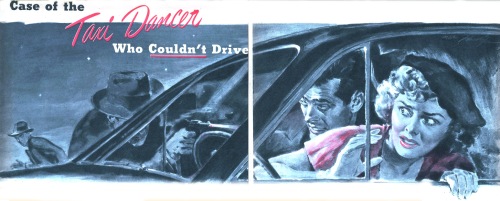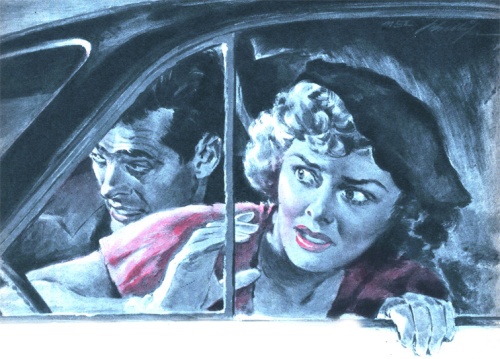
According to the bereaved husband’s account, his attractive wife recognized one of the thugs, who whipped out a gun, reached through the car window and fired twice at her. (Illustration by Mel Phillips)
Sunday Mirror Magazine, March 6, 1949
By SPENCER HARDY
On the surface it appeared to be an ordinary lovers’ lane holdup—until police found some bizarre details on the affirs of the slain red-head behind the wheel
ANY TIME A HUSBAND who has numerous dealings with other women suddenly becomes very attentive to his wife and, just for example, invites her to come along and view the beauties of the Grand Canyon, she had better watch out. He might be planning to push her over the precipice.
Lucille Bolton, a red-haired, dainty creature whom many husbands would nave cherished just for the sake of decoration, if nothing else, accompanied her ladies’-man husband to see a pretty view and, though nothing as spectacular as being shoved off a cliff happened to her, she was effectively done in with a pistol.
Our Lucille was a taxi dancer and her Johnny was a gigolo. Theirs is a story of Hollywood, where life-and death, too, dear reader—can be like a movie.
The setting of Lucille Boltons’s murder was beautiful. Our mind’s eye can see it clearly, aided by the account meted out in painful phrases by young John Bolton in a Santa Monica hospital bed, after they removed a bullet from his shoulder.
It was deep night, the sky moonless but sprinkled with stars. The place was the Lincoln Highway, at a high point overlooking Santa Monica and the Pacific Ocean, in an unpopulated section of what is called the Hollywood hills, about 10 or 12 miles southwest of Hollywood and Vine. Lucille and John had driven out there alone, sometime in the early morning, from the Los Angeles dance hall where she worked.
Tiny Lucille was only a humble taxi-dancer, but the automobile in which she and her husband were sitting while they enjoyed the ocean view was a shiny 16-cylinder Cadillac sedan–rented, to be sure, but quite a luxury. The Boltons had been around Hollywood long enough to know the value of front.
They were parked in a car port. a widened part of the paving provided especially by the highway builders for automobilists who might want to stop there and enjoy the view. Before them, past rustling trees, the hills rolled down to the broad Pacific.
As Bolton told it later, they were just sitting, smoking and talking quietly about his promotion plans, which mainly concerned his project to raise money to open a dance hall, where Lucille would be the hostess. (That was why the handsome, dark-eyed young promoter was always calling on single, middle-aged women–to raise money for the project.)
They were all alone at the spot for quite a while–most people being in bed at that hour of the night—when another car, a Ford coupe, came into the port and stopped at some distance to the right.
“That was at the side of our car where I was sitting,” Bolton explained to police. “Lucille was at the left, at the wheel. She had been driving, which she loved.”
He paused and grimaced, either because of the pain of his shoulder wound or the pain of the memory of his wife’s sweet foibles. Even policemen felt sorry for him.
“Then,” he went on, “two men got out of the car and walked toward us. It was so dark I couldn’t see their faces very clearly, but one was a tall, thin man, and the other was shorter and heavyset. The tall man had a pistol and wore gloves. He poked the gun into my ribs and told me to hand over my money. I gave him all I had–$25. That seemed to satisfy them and they started back toward their car. But then—“
Bolton stopped again and looked pained.
“Then Lucille spoke up. She said, ‘I know that tall man. I’ve seen him when I was at work. His name is Shor.’”
Alas for chatterers. How often they say the wrong thing. Lucille might better at that point have cried, “What a divine night!”–almost anything else, or, better yet, have kept her pretty mouth shut.
As it was–to continue with the bereaved husband’s account-the tall man whirled around, rushed back to the car, reached through the car window past Bolton and. as Lucille held her hand to her face and screamed, shot her twice, once in the heart and once in the left breast.
“Then he turned the gun on me,” said Bolton. “I struggled and managed to push it away from my face, so that when he fired the bullet hit me in the shoulder. I fell over as if I were dead, and he went away.”
space
space
To Capt. William J. Bright, chief inspector of the homicide bureau in the Los Angeles county sheriffs office, this seemed on the face of it to be a very ordinary crime–a stupid, trigger-happy holdup.
There was nothing to do, apparently, except find the man named Shor.
BUT police in real life don’t solve mysteries by simply proceeding from one logical step to another. They try everything, just in case.
There was quite a lot of stuff around the car—a fingerprint on the steering wheel; a .22 caliber cartridge shell on the floor beside the front seat; a .22 caliber pistol in the bushes nearby, with the fingerprints wiped off; Lucille’s coat in the back seat–it was a chilly Fall night–containing money apparently overlooked by the robbers, and Bolton’s topcoat beside it, containing a bankbook showing a balance of $4,048–a surprisingly large sum, considering that Lucille’s income wasn’t sumptuous.
Nothing was to be learned from two men who had started out early on the highway to go duck hunting and. seeing Bolton leaning weakly against the Cadillac and signaling for a ride, had taken the wounded man to the hospital.
Nobody connected with the dance hall professed to know anything about Shor. But Bright’s inquiries at the rental agency, made with no particular angle in mind, turned up evidence of a very interesting individual of that name.
“Yes,” said the proprietor of the agency. “I know the car. I rented it to Mrs. Bolton’s chauffeur late yesterday afternoon.”
This staggered the inspector a bit. With thousands of dollars in the bank and a private chauffeur for Lucille, the Boltons were turning out to be a fascinating couple.
“Mrs. Bolton’s chauffeur?” he exclaimed. “What’s his name?”
“I’ll look it up on the forms we require the driver to sign,” said the agency proprietor. “He’s been renting here for weeks.”
He dug out a handful of driver’s receipts and handed them to Captain Bright. The name signed to them was William Shor.
“A tall, thin man with pale eyes and bushy hair,” said the agency man. “I don’t know where you could find him or anything else about him.”
Now Captain Bright had the basis for a new theory. Lucille and Shor had been taking rides together and a romance had developed. The chauffeur had become jealous. Perhaps she had been intending to leave her husband and had changed her mind. Then, knowing her favorite secluded parking place, he had gone there to kill her. When she made the statement about knowing him, she had naturally lied about the circumstances and not mentioned that she knew him as a lover.
But why did Shor at first merely commit a holdup and turn back to shoot the girl only when he heard her speak his name? Maybe he had meant to shoot her at the beginning but had lost his nerve.
At the Bank of America, Bright learned that the Boltons’ bankbook had been doctored to show its large deposit total, apparently for the purpose of impressing prospective dance hall investors. The Boltons had less than $100 in the bank.
Shor was picked up with almost no trouble. A couple of detectives found him with his chauffeur’s cap on, sleeping off a hangover in the back of a saloon. He was inclined to be uncommunicative until Captain Bright said:
“All right, don’t talk then. But Lucille Bolton named you as her murderer before she died, and I’ve got enough information for a murder warrant.”
When he learned it was Bolton who had told the police about Lucille’s recognition of her killer, Shor was furious.
“The double crosser!” he cried. “He’s trying to frame me!”
He now talked freely and produced a perfect alibi–on account of a bit of obstreperousness, he had been in jail the night before, not only while the murder was committed, but all night.
He said he had rented automobiles not only for Lucille Bolton; he had rented them even more frequently for her husband. This turned out to be true, the rental agency proprietor’s information being incomplete. There bad been nothing between him and Lucille, he insisted. So much, Captain Bright thought, for the jealousy theory.
But a radical new turn developed now. Two women relatives of Lucille turned up and said Bolton had always been a worthless fellow against whom they had warned her and that he was lying when he said she had been driving the car. She had never driven, they said.
The only fingerprints found on the steering wheel were Bolton’s. His wound seemed suspicious to Captain Bright. A surgeon at the hospital agreed with the inspector’s doubts and provided the technical information that the wound was made while the arm was hanging at the side, a queer position for it to be in when the man was supposed to be fighting for his life. A woman from whom Bolton had been trying to get money, for the usual dance hall venture, said she had refused to give him the money when she learned he was married. She had expected him to marry her before any capital changed hands.
space
space
DETECTIVES found the hardware dealer who had sold the pistol found at the scene of the murder. The buyer, he said, was Bolton.
On this strong basis of circumstantial evidence, Bolton was convicted, Jan. 25. 1930, three months later, of the murder of his wife, apparently to get her out of the way of his schemes.
At San Quentin prison, where he was sent for life, he apparently began to brood on his brutality to a trusting wife. Within five years his mind had gone completely to pieces and he was transferred to the Mendocino state hospital, as hopelessly insane.
(NOTE: William Shor is a pseudonym used here to protect a person innocently dragged into the investigation.)
space



